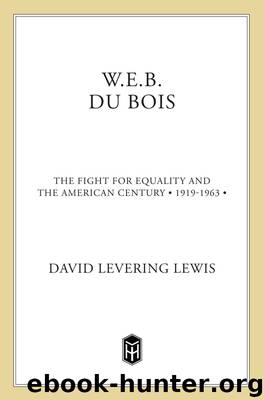W. E. B. Du Bois by David Levering Lewis

Author:David Levering Lewis
Language: eng
Format: epub
Publisher: Henry Holt and Company
12
ATLANTA THE POLITICS OF KNOWLEDGE
The trip around the world ended when the Tatsuta Maru berthed at San Francisco harbor in the second week of January 1937. Du Bois returned to Atlanta by way of New York at the end of the month. He was a year from turning seventy, yet his intellectual clock seemed to run against time, each minute ticking off some rejuvenating social or scholarship challenge that made him think and act like a man half his age. Thus his moral metabolism imparted an urgency to minister to an imperfect world that was often of such feverish intensity that Du Bois wrote and acted as though an hour’s delay or a week’s frustration in improving the social contract risked irremediable catastrophe. Just as he had been revolted by Chinese antipathy to modernizing Japan, so he chafed intellectually at what he saw as the timidity and myopia of the Negro American majority in a time of supreme crisis. Dogmatically certain that “we have lived to see the collapse of capitalism,” he dismissed as chimerical any New Deal attempt to rehabilitate the rule of finance capital. “We cannot stand still,” Du Bois exhorted Africans in America. “We cannot permit ourselves simply to be the victims of exploitation and social exclusion. It is from this paradox that arises the present frustration among American Negroes.”
When he had gone off to Europe and Asia in the spring of 1936, Du Bois had believed that two scholarly projects to which he had devoted considerable preparation were well under way, and he counted on both of them to have a critical impact on the theory and practice of economic and civil rights for his race. The first of these, the Bronze Booklets, a series of small volumes to be edited by Alain Locke and published by a new organization called the Associates in Negro Folk Education, was supposed to take a fresh and ranging look at race relations problems in America. The second enterprise, which had been launched five years earlier without even the courtesy of an invitation being sent to Du Bois, was the far more ambitious Phelps-Stokes Fund venture of assembling a definitive, comprehensive body of knowledge about the American Negro: the “Encyclopedia of the Negro.” The Associates in Negro Folk Education was in reality a racially separate entity created by the American Association for Adult Education (AAAE). The ten-year-old AAAE in its turn was the creature of the Carnegie Corporation, whose president, Frederick P. Keppel, had been inspired by the educational outreach of the British Workers’ Education Association. The impressive pedigree of the Associates in Negro Folk Education and the respectable $200 honorarium persuaded Sterling Brown, Bunche, Harris, Ira Reid, and, among others, even the irascible Woodson, to accept Locke’s invitation to write for the series. After a breakfast meeting following an address to a conference at Howard in late April 1935, Du Bois, overcoming his usual skepticism about the philosophy professor’s intellectual integrity, had agreed to become a series contributor. Locke had assured him that the Bronze Booklets were intended to be a platform for bold ideas.
Download
This site does not store any files on its server. We only index and link to content provided by other sites. Please contact the content providers to delete copyright contents if any and email us, we'll remove relevant links or contents immediately.
| African-American Studies | Asian American Studies |
| Disabled | Ethnic Studies |
| Hispanic American Studies | LGBT |
| Minority Studies | Native American Studies |
Cecilia; Or, Memoirs of an Heiress — Volume 1 by Fanny Burney(32558)
The Great Music City by Andrea Baker(32019)
Cecilia; Or, Memoirs of an Heiress — Volume 2 by Fanny Burney(31956)
Cecilia; Or, Memoirs of an Heiress — Volume 3 by Fanny Burney(31942)
We're Going to Need More Wine by Gabrielle Union(19046)
All the Missing Girls by Megan Miranda(16029)
Pimp by Iceberg Slim(14508)
For the Love of Europe by Rick Steves(14121)
Bombshells: Glamour Girls of a Lifetime by Sullivan Steve(14076)
Talking to Strangers by Malcolm Gladwell(13370)
Norse Mythology by Gaiman Neil(13365)
Fifty Shades Freed by E L James(13241)
Mindhunter: Inside the FBI's Elite Serial Crime Unit by John E. Douglas & Mark Olshaker(9343)
Crazy Rich Asians by Kevin Kwan(9292)
The Lost Art of Listening by Michael P. Nichols(7506)
Enlightenment Now: The Case for Reason, Science, Humanism, and Progress by Steven Pinker(7314)
The Four Agreements by Don Miguel Ruiz(6765)
Bad Blood by John Carreyrou(6622)
Weapons of Math Destruction by Cathy O'Neil(6281)
